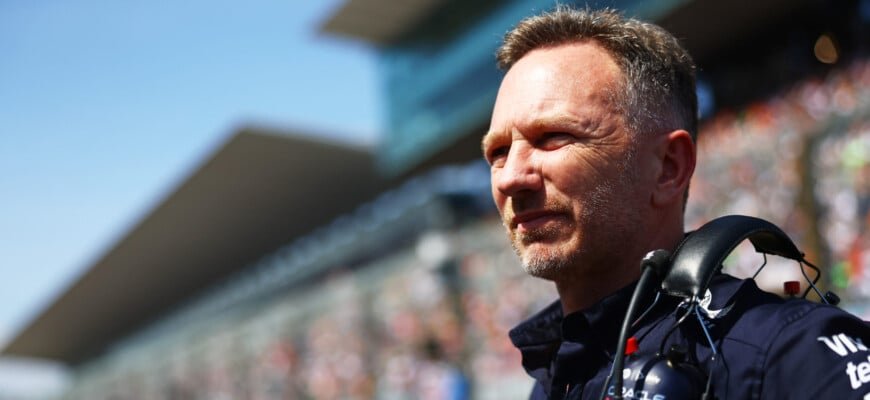Martin Brundle Critiques Christian Horner’s Focus on Max Verstappen
In the world of Formula 1, team dynamics and leadership decisions can significantly impact a team’s performance on the track. Recently, former F1 driver Martin Brundle weighed in on the leadership of Christian Horner during his tenure with Red Bull Racing. Brundle believes that Horner’s intense focus on driver Max Verstappen ultimately hindered the team’s overall performance. This commentary comes at a pivotal moment, following Horner’s departure from the team after two decades, with Laurent Mekies, the leader of the secondary team Racing Bulls, stepping into the role.
Challenges Facing Red Bull Racing
Red Bull Racing has experienced a series of challenges in recent seasons, particularly in accommodating multiple drivers on their roster. While Verstappen has been a dominant force, other drivers like Liam Lawson, Sergio Pérez, and Yuki Tsunoda have struggled to unlock the full potential of their cars. This has raised questions about the team’s strategic direction and how they can effectively support multiple talented drivers.
Brundle pointed out that focusing primarily on Verstappen may have had negative repercussions for Red Bull. He noted that the team has been home to several exceptional drivers over the years, including David Coulthard, Mark Webber, Sebastian Vettel, and Daniel Ricciardo. However, the narrative has shifted in recent times, with younger talents like Alex Albon, Carlos Sainz, and Pierre Gasly finding it difficult to thrive under the current structure, particularly with Verstappen being a standout performer.
The Impact of Leadership Decisions
Brundle’s assessment highlights the critical nature of leadership in Formula 1. He remarked, "The problem for Christian was that he had to focus everything on Max. This, in some ways, harmed the team." With such a laser focus on one driver, the team may have inadvertently marginalized the contributions of others, leading to a less competitive environment across the board.
This situation reflects a broader issue within motorsport, where the success of one driver can overshadow the potential of others. Teams often face the dilemma of balancing the needs of a star driver with the development of their overall team dynamics. Brundle’s comments suggest that this focus on Verstappen could have stunted the growth and performance of the entire Red Bull team.
The Future of Red Bull Racing
Horner’s exit comes amid speculation about Verstappen’s future, particularly concerning a potential move to Mercedes, especially with the impending changes in technical regulations next year. This uncertainty has created a buzz in the F1 community, with fans and analysts alike pondering what this shift means for the team and its star driver.
Despite the rumors swirling around Verstappen’s potential departure, Brundle expressed a belief that Horner’s dismissal might actually encourage the reigning world champion to remain with Red Bull. He commented on the timing of Horner’s exit, stating, "It’s a strange moment to do this, and I would say it comes with a sense of urgency. We don’t know what happened behind closed doors, but I know Verstappen’s team wasn’t pleased with Horner being there." This sentiment underscores the complexity of team dynamics and how leadership changes can influence a driver’s decision-making process.
Verstappen’s Commitment to Red Bull
Brundle speculated that the changes within Red Bull Racing could lead Verstappen to feel more inclined to stay with the team in the coming year, regardless of any exit clauses he may have in his contract. His intuition suggests that a fresh approach to leadership could rejuvenate the team atmosphere and provide a more supportive environment for Verstappen to continue his pursuit of success.
The relationship between a driver and their team principal is crucial in Formula 1, as it can greatly affect the driver’s morale and performance. A supportive and effective leadership structure is essential for maximizing a driver’s potential and ensuring that the entire team operates at its best. If the new leadership under Mekies can foster a more inclusive atmosphere, it may pave the way for a stronger Red Bull Racing in the future.
The Importance of Team Dynamics
In Formula 1, the synergy between drivers and their teams can significantly influence results on the track. A harmonious team environment enables drivers to perform at their best and enhances the overall competitiveness of a team. When one driver consistently outshines others, it can create an imbalance, affecting the morale and performance of the entire team.
Brundle’s insights shed light on how critical it is for teams to cultivate a culture that values the contributions of all drivers. By not allowing one individual to overshadow the rest, teams can foster an atmosphere where every driver feels empowered to excel. This approach not only maximizes the potential of individual drivers but also strengthens the team as a whole.
Looking Ahead
As Red Bull Racing embarks on a new chapter with Laurent Mekies at the helm, the future looks uncertain yet full of potential. The team will need to navigate the challenges of retaining their star driver while also ensuring that other talents have the opportunity to shine.
With the right leadership and a renewed focus on team dynamics, Red Bull could emerge more competitive than ever. The upcoming season will serve as a critical test for Mekies and the entire organization as they seek to balance the needs of their drivers while striving for championship glory.
Conclusion
In summary, Martin Brundle’s critique of Christian Horner’s leadership at Red Bull Racing highlights the significant impact of focusing too heavily on one driver. As the team transitions to a new leader, the potential for a more balanced and inclusive environment could set the stage for renewed success. The world of Formula 1 is always evolving, and Red Bull Racing’s ability to adapt to these changes could determine their fate in the years to come.
